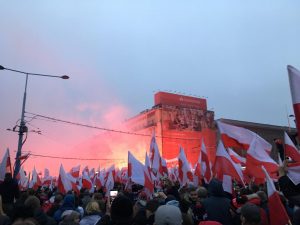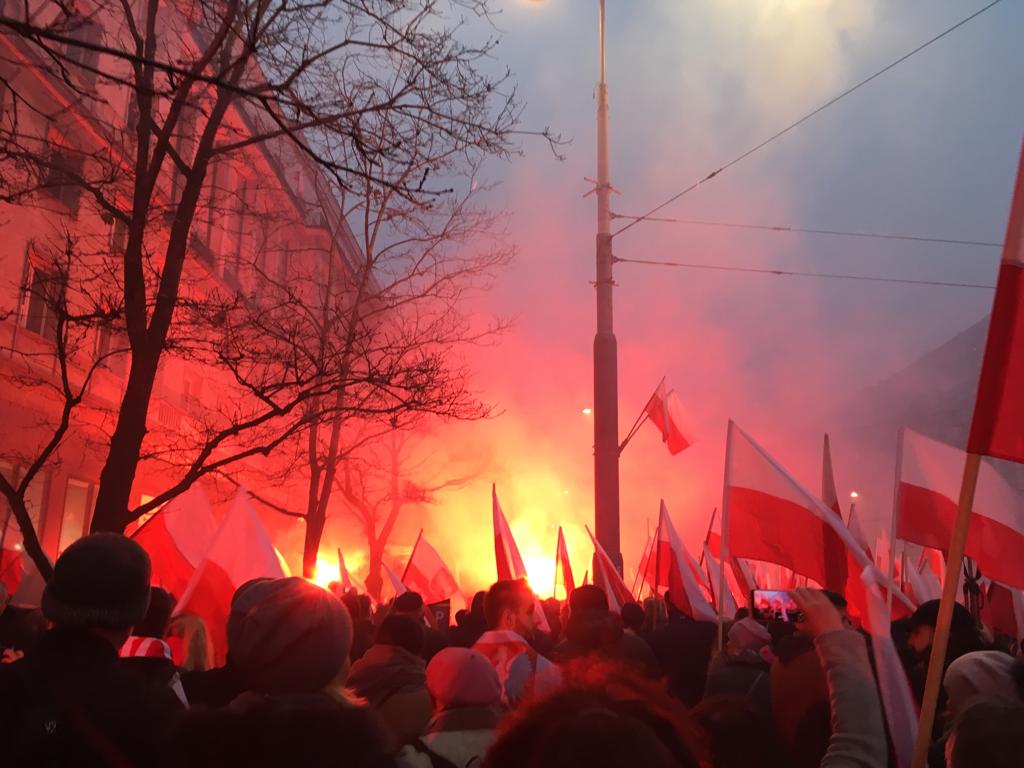Last year’s march – which attracted about 60,000 participants – sparked a controversy due to the prominence of xenophobic and fascistic symbols. It was said to be the largest gathering of far-right activists in Europe in recent years.
Traditionally, the day had been marked by official processions and family gatherings, with celebrations of fireworks and parades.
Since 2010, a march has been organised by the National-Radical Camp (ONR), the National Movement (RN) and the All Polish Youth (MW) whose roots trace back to anti-Semitic groups that were created before World War II.
Critics say the event has increasingly served as a platform for nationalist, far-right and white supremacist groups to express their view of Poland. Participants hold slogans featuring nationalistic, anti-immigrant, homophobic and white supremacist language. Some chanted and held banners that read “White Europe”, “Clean Blood” and “Pray for Islamic Holocaust”, while chanting “The whole Poland sings with us: F*** off with the refugees.”
But Marta Kotwas, a PhD researcher at University College London (UCL) and women’s rights activist who attended this year’s march, said: “The tenor was not as nationalistic, as last year. It was mostly peaceful, and the crowd seemed very mixed. Most people raised flags with national symbols. But aggressive symbols were shown by those who organised the march – by which I mean ONR and MW.”
Nationalists also tweeted about burning the EU flag and crowds chanting to take Poland out of the alliance it joined in 2004, along with other Eastern bloc countries.
The commemoration also attracted members from far-right groups in Hungary, Italy and the U.K.
 This year is the first time Polish officials took part in the Independence March after what Kotwas described as “complete organisational chaos.”
This year is the first time Polish officials took part in the Independence March after what Kotwas described as “complete organisational chaos.”
A few weeks prior to the event, the government had tried to place the event under state-control banning participants from carrying any banners, and only flags.
However, the march’s organisers appealed, and a Warsaw local court overturned the ban, stating that “the freedom of assemblies plays an important role in a democratic state of law…the right of assemblies is protected by the constitution.”
The president negotiated with the organisers to hold a joint-event, which resultingly granted the march the status of a ceremony.
Speaking at a news conference, Warsaw’s liberal Mayor, Hanna Gronkiewicz-Waltz, who supported the ban, said: “This is not how the celebrations should look on the 100th anniversary of regaining our independence.”
She said that Warsaw, which was almost completely annihilated by Nazi Germany, “has suffered enough because of aggressive nationalism.”
The government’s response sparked a debate about whether the ruling party Law and Justice tacitly encourages the radical groups.
“The government has legitimised an event which has been very controversial,” said Kotwas, who also highlights that police and secret service did a lot to avoid compromising safety at the march. “They arrested around 100 people 48 hours before the commemoration to prevent them from joining the march.”
Poland’s President Andrej Duda has condemned the racism at the march, while other officials, such as the Interior Minister, praised what they called a ‘great’ show of patriotism.
Poland has seen a surge in nationalism since the collapse of communism. The country is believed to have the fifth highest number of far-right activists in the world, behind Germany, Hungary, the Czech Republic and the United States.
Opponents are increasingly concerned by the silencing critical voices and undermining of the law under Poland ruling Law and Justice party (PiS). They also argue the government emboldening far-right nationalists with its populist them-against-us rhetoric, casting western Europe and immigration the enemy.
Photos: Marta Kotwas

